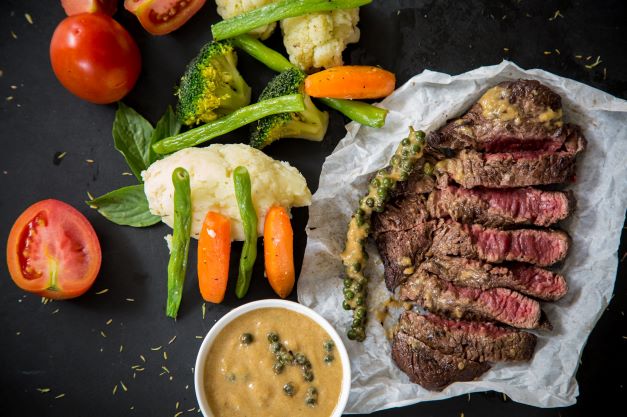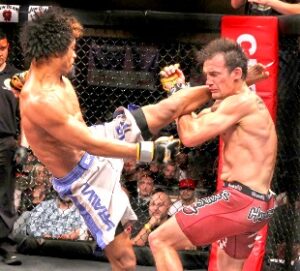
Are you wondering about UFC diets and more specifically what UFC fighters eat?
In this article, we’ll cover what food UFC fighters eat and how this changes throughout the year depending on their circumstances; such as their time away from fighting, training camp, fight week, after weigh-ins, and on fight day.
Contents
UFC Fighter Diet
A UFC fighter’s diet has the purpose of providing nutrition for their priority of training. Therefore, a UFC diet is nutritious, filling, balanced, energizing, and enjoyable so that a fighter can stick to it consistently in order to perform at their most optimal when training.
Nearly every meal has fruit or vegetables as these provide minerals, vitamins, and fiber, which keep a fighter full and provide necessary nutrition.
Their meals also have a good balance between protein, carbohydrates, and fats, so as to not be deficient in any micro or macronutrient and to fuel the body with everything it needs to perform.
The most important macronutrient for UFC fighters is carbohydrates. This is because their workouts are highly glycolytic, meaning they rely on carbohydrates to fuel activity. A high amount of carbohydrates keep blood sugar levels and glycogen levels high which are essential for optimal performance.
The percentage of carbohydrates a UFC fighter eats is determined by their current situation and future goals, such as whether they have an upcoming fight or have time away from fighting. This is because their calorie requirements will be different – which will be explained later in the article.
A UFC fighter’s diet also consists of around a gallon of water a day (4.5 liters), for optimal health, hydration, and performance. UFC fighters are training 5 or 6 days a week, multiple times a day, and are therefore sweating a lot. Some fighters drink 5 to 7 liters of water on their most intense training days.
So, what types of foods do UFC fighters eat specifically?
UFC Fighters’ Diet: Fruits & Vegetables
A UFC fighter’s diet consists of as many vegetables as they please, whenever they please. Vegetables are essential for micronutrients and overall health and performance.
There aren’t any specific vegetables that must be eaten, just as long as they’re eating a good portion of vegetables, at least 2 or 3 times per day.
Some of the most popular vegetables in a UFC diet are green leafy vegetables such as spinach, kale, arugula, and cruciferous vegetables such as bok choy, broccoli, and cabbage. Leafy greens are the most popular because they’re the most nutrient-dense, are quick to cook, and mix well with many meals.
For fruits it’s the same, fighters aim for 2 or 3 servings of fruit per day, if not more depending on their current situation. They provide great micronutrients and short-term energy for workouts and post-workout recovery due to their naturally occurring sugars.
Some of the most popular fruits in a UFC diet are bananas, blueberries, kiwis, apples, strawberries, and mangos. All fruits provide different nutrients so variety is key for optimal performance and health.
UFC Fighters’ Diet: Protein
Protein is essential for repairing cells and building new ones in the body, especially for the high amounts of muscle mass UFC fighters carry.
Protein is the most varied macronutrient in a UFC fighter’s diet. This is because some fighters are vegan or pescatarian, and some eat fewer animal products because of their belief they cause high inflammation due to the saturated fats.
Overall though, most fighters get their protein requirements from high-protein sources such as meat and fish, more specifically: chicken, beef, turkey, eggs, salmon, barramundi, and tuna. They also eat beans, yogurts, nuts, and pulses (legumes).
UFC Fighters’ Diet: Carbohydrates
Carbohydrates are the body’s primary source of fuel. They’re converted to glucose which is used as energy for physical exercise and optimal brain and bodily functions.
Outside of fruits and vegetables, which are carbohydrates but are eaten mostly for their micronutrients, UFC fighters eat whole foods. Whole foods have been processed and refined as little as possible and are free from artificial additives.
Some of the most popular carbohydrates are potatoes (white or sweet), rice (white or brown), whole wheat (pasta, wraps, bread), quinoa, oats, and chickpeas.
Not only do these carbohydrates provide great energy but they also provide great micronutrients and fiber. Carbohydrates much like other food sources should be varied to achieve a greater balance and wider array of nutrition.
UFC Fighters’ Diet: Fats
UFC fighters get their fats from the most healthy sources. They’re aiming to eat monounsaturated and polyunsaturated fats rather than saturated and trans fats.
Healthy fats are essential in providing energy for a fighter as well as regulating hormones and the uptaking of nutrients and vitamins.
Some of the best options for healthy fats are olive oil (for cooking), nuts (almonds, walnuts), avocado, eggs, seeds (chia, flax), fatty fish (salmon), and tofu.
What Supplements Do UFC Fighters Take? (And Extras)
On top of their micro and macronutrient needs, a UFC diet also consists of small extras and various supplements.
Some examples are:
High-quality protein powder – Reduces the amount of meat and fish they need to eat and also staves away cravings because the powder can be flavored. Chocolate protein is very useful for this because many crave chocolate.
Beta-Alanine – An amino acid used as an endurance buffer as it removes the hydrogen atom that causes lactic acid to build up in muscles. It’s used a lot in pre-workout supplements and it gives the muscles a tingling feeling.
Caffeine – Improves focus, mental cognition, endurance, and power. Taken once or twice a day before a training session, but not after 3 pm as it may affect sleep if taken within 8 hours of bedtime.
Creatine – Naturally produced by the body but with supplementation of 3 to 5 grams per day, it can increase strength, lean muscle mass, and energy, while also decreasing muscle recovery time. Creatine isn’t used in the 2 to 3 weeks before a fight as it causes water retention – where fighters are trying to expel water during a weight cut.
Electrolytes – Minerals lost through urine and sweat that are replenished with either food or supplementation. Electrolytes ensure muscles and nerves function properly and are usually taken after a cardio session where an athlete sweats a lot of sodium out. These are also avoided during a weight cut.
Extras – The extras are little ingredients with a whole host of health benefits. Some examples are apple cider vinegar, turmeric, ashwagandha, and maca root.
How Many Calories Do UFC Fighters Eat Per Day?
The amount of calories UFC fighters eat per day depends on their current weight and their future plans. A fighter may be:
- Off-season and have no upcoming fight – calorie surplus of 500-800
- Fight camp for a fight 3 months away – calorie maintenance or deficit of up to 500
- Fight week – calorie deficit of 250 to 750
- Post-weigh-ins – calorie surplus of 500
Off-Season
A UFC fighter’s off-season may typically be between 3 to 9 months, but they can take as long a break from fighting as they want as they’re independent contractors.
During an off-season, a UFC fighter may focus on gaining muscle. This requires a long time away from fighting as building muscle is a slow process.
However, most fighters when entering the UFC are already around their natural weight class and mostly spend their off-season focusing on enhancing their skills.
The exceptions are young UFC fighters who join between the ages of 18 to 23 and have to fill out their frame with muscle, but also experienced fighters who are committing to moving up a weight class division and therefore need to pack on 10 to 15 lbs of muscle.
Jon Jones is the perfect example. It’s going to be over 3 years before he returns to the octagon as he’s been building muscle to go from light heavyweight (205 lbs) to heavyweight, which has a maximum weight limit of 265 lbs.
So, if a UFC fighter has to build muscle, natural athletes eat a daily surplus of 500 calories over their maintenance weight until they hit their goal weight or body mass index. This allows them to gain roughly 1 lb of muscle per month.
For UFC fighters using steroids, they’ll eat a daily surplus of 1000 calories and aim to gain 1 lb of muscle per week. Both are rough guidelines because everyone is different and fighters will adjust the surplus lower if gaining too much body fat, and higher if not gaining enough muscle or lacking energy.
For fighters whose focus isn’t on building muscle, their caloric intake will usually be around maintenance or up to 300 over to give themselves more energy to train harder; which in turn burns more calories.
Fight Camp
When a fighter has built the muscle, cardio, or skills needed, they’ll schedule a fight with the UFC and prepare with a fight camp. Fight camps last 6 to 12 weeks and see a UFC fighter’s diet enter a maintenance or calorie deficit depending on how much weight they need to lose.
They need enough calories to train intensely and optimally, while slowly losing body fat for the upcoming weigh-ins. How much body fat a fighter has to lose determines the calorie deficit they’ll be in.
Most fighters have a maximum deficit of 500 calories per day, as this allows them to slowly lose body fat each week, roughly 1 to 1.5 lbs, while also maintaining their muscle mass. More extreme calorie deficits mean muscle mass is likely to be lost along with body fat.
By the end of a 3-month training camp, a fighter can easily have lost 12 lbs of fat or more without lacking energy for their workouts because they’ve slowly dropped the calories.
For example, if a fighter’s maintenance calories are 3500, they’ll eat 3000 daily. These are rough guidelines and on days of fewer calories burned they may eat 2900, while on more intense calorie-burning days they’ll eat 3100.
Fight Week
Most of the body fat has been lost during training camp, so the focus during fight week is to cut water weight. Cutting weight is extremely taxing on the body and mind, so a fighter will want a maximum calorie deficit of 500 to keep energy levels high enough.
If a fighter has to lose more body fat in the final week, they may stretch their deficit to 750 at most.
Post-Weigh-ins
After a fighter has successfully made weight on Friday morning between 9 am and 11 am, they immediately up their calories from a deficit to a surplus of 500 or more.
This is because they need to replenish energy and glycogen in their muscles for their upcoming fight.
What Do UFC Fighters Eat to Cut Weight?
Cutting weight refers to two main things:
- Losing body fat during fight camp
- Cutting water weight during fight week
As mentioned above, fighters aim to slowly lose body fat during fight camp by reducing their calories by roughly 500 below maintenance. To do this they’ll eat fewer carbohydrates as it’s the most easily manipulated macronutrient and fewer fats because they only need so much.
As a general guideline, most UFC fighters’ diets follow a 3:2:1 rule for fat loss, which is 3 grams of carbohydrates per kilogram of body weight, 2 grams of protein, and 1 gram of fat.
For example, a 145 lbs featherweight may have a walking weight of 170 lbs (77 kg) and therefore eat 231 grams of carbohydrates (924 calories), 154 grams of protein (616 calories), and 77 grams of fats (693 fat calories).
This is a total of 2,233 calories and is roughly a 500-calorie deficit for a featherweight fighter when cutting body fat, give or take depending on calories burned, muscle mass, and genetic factors such as metabolism.
These calories will slowly come down as weight is lost to keep the deficit at 500. Carbohydrates are the first to be reduced but fats may also take a hit.
To cut weight during fight camp, fighters eat balanced and nutritious foods, with a focus on good quality proteins, whole foods, and plants for carbohydrates, and poly and monounsaturated fats from nuts, seeds, and fish.
A UFC Fighter’s diet drastically changes during fight week when fighters are cutting water weight. This is because their priority has changed from training to manipulating their weight through a water flush.
In order to flush water weight from their system, a fighter can eat a maximum of 50 grams of carbohydrates a day (200 calories). This means all carbohydrates are cut, except vegetables in restricted amounts.
Carbohydrates are restricted to 50 grams per day because each gram of carbohydrate pulls between 2.5 to 3 grams of water weight into the body, which prevents a fighter from entering flush mode.
Fighters must also restrict salt during this time as sodium causes the body to retain water, so having less sodium in the body naturally causes the body to expel water and the reduction of carbohydrates helps them achieve this.
With a fighter’s diet down to 50 grams of carbohydrates and still wanting a maximum 500-calorie deficit, a UFC fighter will eat more protein and a lot more fat.
Higher protein intake will help them maintain muscle mass, while fat is 9 calories per gram so it helps them easily achieve their calorie target.
Fat is also very important during a weight cut as it helps the body absorb vital nutrients, keeps blood pressure under control, and protects organs – at a time when a fighter’s organs can malfunction because of dehydration.
What Do UFC Fighters Eat After Weigh-Ins?
After weigh-ins, a fighter is aiming to gain back the water weight they lost during fight week, and replenish their strength, energy, and electrolytes.
First of all, a fighter must rehydrate. They do this by drinking 1 liter (2.2 lbs) of water per hour, as this is the most the body can absorb. The body will lose 25% of this water as urine, so over 16 hours (8 hours of sleep) a UFC fighter can replenish 12 liters of water or roughly 26.4 lbs.
They then have the rest of fight day to get as close to full hydration. Fighters continue drinking less than 1 liter every hour as they don’t want to enter a fight feeling full and bloated from too much water.
If a fighter overdrinks on fight day they may feel just as bad as they did during fight week due to the kidneys not being able to flush the extra water – some fighters retain over 80% of the water they drink.
The food UFC fighters eat after weigh-ins is exactly the same as they’ve been eating throughout fight camp and fight week, but in a 500 to 750-calorie surplus, if not more depending on how they feel. They eat in a surplus because they need to replenish their energy and strength.
They eat the same healthy foods throughout this time that are well-familiarized with their digestive system and give them the nutrition required for optimal performance.
Introducing foreign food at this time could have negative effects on a fighter because they don’t know how their body and brain will respond and how the food will settle, for example.
What Do UFC Fighters Eat on Fight Day?
UFC fighters eat the same foods on fight day that they’ve been eating throughout their fight camp, fight week, and post-weigh-ins to reduce variability and increase predictability.
More specifically though, UFC fighters eat a huge breakfast on fight day – roughly 1 and a half or 2 times the size of their normal breakfast. In terms of calories, they’ll look to eat at least 1000 calories and even up to 1500 for breakfast.
Breakfast is when the most carbohydrates are eaten so that they’re in the system for the day. Also, avoiding too many carbohydrates in the later meals before a fight helps fighters avoid any sluggishness. Carbohydrates also contain the most fiber, which is to be avoided later in the day because of nerves.
Fighters eat whole wheat bread, oats, fruits, greek yogurt, vegetables, and any other carbohydrate their body has gotten used to during fight camp. For proteins and fats, it’s much the same story. Eggs are the go-to, along with turkey bacon, greek yogurt, avocado, nuts, and protein shakes.
After their huge breakfast, a fighter will rest and relax and let the meal digest. They may have a 1 to 2-hour nap followed by a light movement session where the goal is to manage nerves, reinforce training, tactics, techniques, and anything else necessary for the upcoming fight.
For lunch, a fighter will have similar to what they’ve been eating during training camp. It’ll be a moderately sized meal with good quality proteins such as eggs, lean meats, or fish, a complex carbohydrate such as quinoa, oats, pasta, or brown rice, and a large serving of vegetables.
Lunch is between 600 to 900 calories and a moderate portion of carbohydrates to avoid any feelings of bloatedness or sluggishness as the day approaches fight time.
After lunch, fighters relax to allow their food to digest and hydrate by sipping on water and electrolyte water.
Fighters then snack for the rest of the day, eating portions of 100 to 200 calories at a time. This will include foods such as almonds, rice cakes, fruits, and vegetables.
Depending on the time an athlete is scheduled to fight, there may be time for a small dinner if they can eat 3 hours before a fight. This relies a lot on whether they’re fighting at 5 pm or later in the event at around 10 pm or later. Dinner is half their normal size, around 400 to 600 calories at most.
After dinner, fighters go to the venue and take small snacks to keep blood sugar levels topped off.
Overall, a UFC fighter’s diet should be kept very simple on fight day. Nerves play a big part before a fight and the fighter whose stomach is settled and mind is focused will have a much better time.
Also, for a fight, an athlete wants to compete more so with an empty stomach than a full stomach. This is because digestion requires blood flow, which takes away blood flow from muscles and the heart which is most essential for strength and cardio.
The Bottom Line
So, what do UFC fighters eat?
UFC fighters eat a predictable and disciplined diet for most of the year, with the exception being during an off-season when they have more leeway.
At all times though, a UFC fighter’s diet consists of a highly nutritious and balanced diet that ensures they’re getting every micro and macronutrient their body needs to perform optimally in the gym and on fight night.
This sees UFC fighters eat tonnes of vegetables, many fruits, whole foods, lean meats, fish, seeds, nuts, and many other healthy foods.
A UFC diet needs to be exceptional because along with sleep, they dictate how well a fighter performs in training and in a fight. No fighter inside the top 15 of the UFC got there without perfecting their diet and nutrition.




